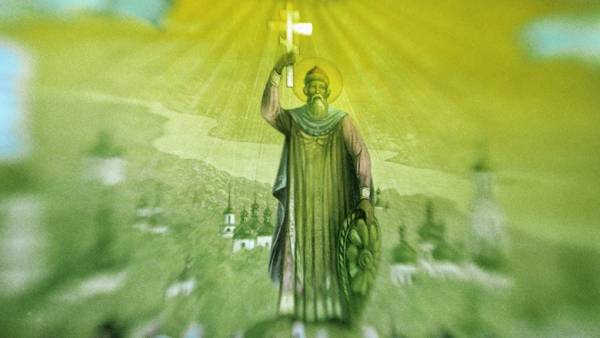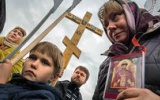The test of faith: myths about the baptism of Rus
Vladimir Petrukhin — the reasons why the Baptist Prince Vladimir of Kiev to accept Christianity.

Christianity in Russia is executed 1030. And numerous scientific meetings organized whenever approaching a round number, and could not answer questions that have already several centuries of concern to those interested in Russian history. Suffice it to say that the unknown is not only the exact time of baptism — a celebration tied to the day of memory of Prince Vladimir (July 15, Julian calendar), but the place of baptism, because of the Byzantine Chersonesos (Korsun ‘ chronicle), where, according to legend, the Prince converted to Christianity, was located far from the Russian land.
Where he baptized the Prince who had returned from Korsun to Russia — in Kiev or Vasyliv — during the compilation of the Primary chronicle (Tale of bygone years, at the turn of XI and XII centuries) spoke differently. That is the characteristic of a folk memory, written evidence of the baptism of Russia, which would seriously adjust the Tale of bygone years, almost did not survive.
“Fotieva baptism”
Strange is the silence of the Byzantine sources of the baptism of the Russian land. This fact traditionally try to explain the historiographical myth, created by the Byzantine Patriarch Photius over a hundred years before the baptism of Vladimir.

Patriarch witnessed the first campaign of Russia — squads nearly took in 860 Constantinople “on the spear”. RAID hitherto unknown peoples of Rus ‘ not only shook the Byzantine Empire: in Rome, which is Constantinople competed for the primacy in the Church hierarchy, could not help but gloat about the invasion of the heathen-pagans and called it a manifestation of God’s wrath.
Photius responded with a message, which stated that Rus was so unnerved in the Byzantine Empire that adopted Christianity, having summoned to his Bishop.
However, the place where he went invited by the pastor, remained nameless, and no traces of Christianity among the Rus in the IX century was not detected.
But, according to followers of the early “Fotieva baptism”, it explains why Byzantium did not pay much attention to the conversion to Christianity of Vladimir after a hundred years.
Recalcitrant pagan prophetic Oleg
Nevertheless, Christianity was known in Russia long before Vladimir and was associated with campaigns against Constantinople. After the victorious campaign of Oleg in 907 (also referred to Byzantine sources, like the baptism of 988) the Greeks tried to impress the Prince of the Church beauty, but Oleg remained a stubborn pagan.
News the schism. As Russian patriots did traitors and spies
the schism. As Russian patriots did traitors and spies
The situation changed in 30 years, with the next generation of the Russian elite: Prince Igor at 940 years were not quite successful campaigns against Byzantium, but beneficial for Russia peace was concluded in 944. Take an oath to keep the peace by Russian combatants were divided: the pagans swore by Perun before, Christians in the Church of Elijah.
The chronicler rewrote the Treaty of 944 years in the early XII century, thought that we are talking about the contemporary Church of Kiev. Enthusiasts who believe in “Fotieva baptism,” argue that the contract in Kiev there was a Church. However, the study of diplomatic Protocol of the contracts showed that it was about the Constantinople Palace Church. Russian vigilantes, who served from the time of Oleg in Tsargrad, was used to the customs of the Greeks-Christians: it formed the Varangian guard, trusted with the guard of the Emperor himself.
The trick of Princess Olga
Almost fairy story about tweaks to help the hero in a difficult situation, linked in Chronicles with the visit to Constantinople of the widow and heiress of Igor, Princess Olga, who wanted to be baptized from the Emperor himself. According to the Chronicles, the Emperor had the hots for Olga (a lady quite advanced in years), and she promised to answer him after baptism. The ceremony took place, but Olga has announced that it cannot allow sin, and the godfather…

The historical essence lies in the fact that Olga had diplomatically insist on his baptism, promising military assistance, as Byzantium is not easy in the treatment of “barbarians”. To speed up the process, the Princess called to Kiev German Bishop, showing the Greeks that their intransigence will lead to the victory of the rival of the Roman Church.
The legend of Andrew the first-called in Russia
Another famous historiographical myth associated with Andrew, as a forerunner of Russian Christianity. The story of his journey is included in the initial part of the Tale of bygone years.
News Saints without permission
Saints without permission
The chronicler, describing the beginnings of Christianity in the Slavic world, dramatically broke the story about the founders of the Slavic alphabet Cyril and Methodius. The fact that their mission at the Danube the Slavs were a continuation of the mission of Paul the Apostle to the “Gentiles”, and Paul the Bishop of Rome. Since the original chronicle was compiled after the separation of churches in 1054, Russia needed its own Apostle.
Such was Andrew, no wonder he taught on the shores of the Black sea, which the chronicler called “the Russian”. It remained to conclude that Andrew taught and in Korsun, and from there it was convenient to go through the future Russian land to the Varangians and later in Rome, at the roundabout (around Europe) route from the Varangians to the Greeks. This cosmography is needed was the chronicler because in his picture of the world the Slavs in the era of Apostolic preaching was still on his Danubian urheimat, the original Rus were generally concentrated in the Varangian (Baltic) sea.
The chronicler understood that every baptized people should have their Apostle.
The myth of the journey, Andrew was not a forgery in the spirit of the cap of Monomakh, when claim to power was motivated by the obvious hoaxes. This pious design, compiled by the monk-scribe, who knew that every baptized people should have their Apostle. Russia was baptized for a hundred years before the writing of the first Chronicles, and the responsibility of the compiler to find the prophet of Russian Orthodoxy. The truth of his predictions, testified themselves of the Church of Kyiv.
In the history of the modern Russian state pious national-romantic myth of the early middle Ages, supported by historians Mikhail Lomonosov and N. M. Karamzin, has quite an official sequel — the order of our country remains the order of St. Andrew.“Viking” and the choice between the cross and the sword
Not less myths generates the figure of the Baptist of Russia Vladimir. He was the son of a warrior Svyatoslav, who did not heed the entreaties of his mother Olga to be baptized — “the squad laughed at,” said the Prince. He believed in the power of the sword, but not in the power of the cross. Volodymyr’s choice of faith — the cross or the sword — was dictated by the story.